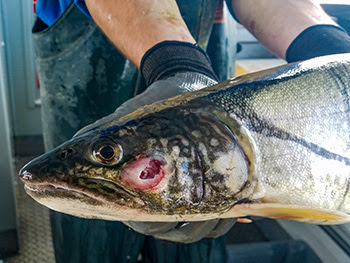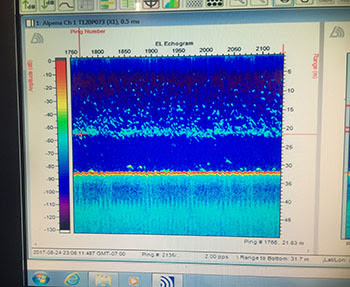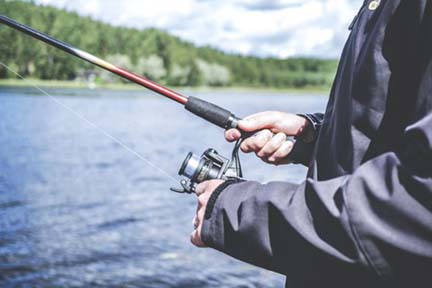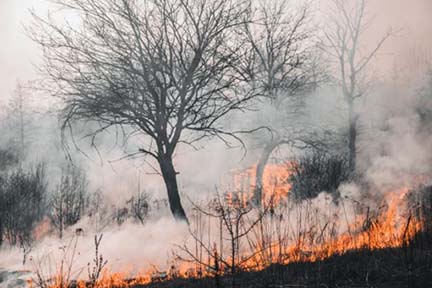Aboard the DNR’s Survey Vessel Steelhead
By DAVID CLAPP
Michigan Department of Natural Resources
The year 1968 is often described as one of the most tumultuous and momentous in American history.
Among the year’s many events, there was an Apollo moon orbit, landmark civil rights legislation passed and the assassinations of Martin Luther King Jr. and Robert F. Kennedy.
That same year, an event on Lake Michigan marked a turning point for natural resource management and conservation on the Great Lakes. The Survey Vessel Steelhead set forth from Charlevoix for its first year of fisheries surveys on the lakes.
 Construction of the S/V Steelhead, built in Escanaba by the T.D. Vinette Company, was completed in April 1968. Soon after, the S/V Steelhead set out for its first fisheries assessment operations – investigating the distribution, abundance, growth and diet of major fish stocks on lakes Michigan and Huron. These first assessments are documented in an amazing book titled “The Salmon Hunters,” written and illustrated by the first captain of the S/V Steelhead, William J. Palmer. Construction of the S/V Steelhead, built in Escanaba by the T.D. Vinette Company, was completed in April 1968. Soon after, the S/V Steelhead set out for its first fisheries assessment operations – investigating the distribution, abundance, growth and diet of major fish stocks on lakes Michigan and Huron. These first assessments are documented in an amazing book titled “The Salmon Hunters,” written and illustrated by the first captain of the S/V Steelhead, William J. Palmer.
Since construction of the survey boat, the Michigan Department of Natural Resources has gone on to commission vessels at each of its Great Lakes research stations.
The Research Vessel Channel Cat (at the DNR’s Lake St. Clair Fisheries Research Station) was also launched in 1968. At the Marquette Fisheries Research Station, the R/V Lake Char replaced the R/V Judy in 2007, and the newest vessel, the R/V Tanner, went into service in 2017, replacing the R/V Chinook at the Alpena Fisheries Research Station. The R/V Tanner was named for Dr. Howard Tanner, a former DNR director who is widely recognized as the father of the Great Lakes salmon fishery. |
 While these vessels have similar missions on each of the lakes, the S/V Steelhead is unique among DNR vessels in that crew can live aboard. This allows the boat to work for extended periods far from its home port and facilitate surveys at remote locations, such as around islands and reefs in the middle of the lake or those that require extending beyond a traditional 8 a.m. to 5 p.m. shift. While these vessels have similar missions on each of the lakes, the S/V Steelhead is unique among DNR vessels in that crew can live aboard. This allows the boat to work for extended periods far from its home port and facilitate surveys at remote locations, such as around islands and reefs in the middle of the lake or those that require extending beyond a traditional 8 a.m. to 5 p.m. shift.
The original design of the vessel was intended to allow for weeklong, offshore sampling cruises with a crew of five. This foresight has reaped benefits throughout the history of the Lake Michigan fisheries program, with collection of unique and valuable information that would have been impossible from small boats limited to nearshore sampling.
The accommodations aboard the vessel are pretty spartan, with bunks for four crew members below deck and housing for the vessel captain in the pilot house. The galley is furnished with a refrigerator, stove, microwave and coffee maker – important for keeping the crew alert during early-morning and late-night surveys.
On the deck above the crew quarters, an enclosed, heated laboratory allows for sample workup and archiving in all seasons and weather conditions, with two chest freezers and an ice machine in the vessel hold to ensure all samples come back to Charlevoix in good condition. |
 Since that initial cruise described in William Palmer’s book, the S/V Steelhead has been involved in numerous surveys and research studies that have directly benefitted Michigan’s fisheries. Since that initial cruise described in William Palmer’s book, the S/V Steelhead has been involved in numerous surveys and research studies that have directly benefitted Michigan’s fisheries.
Two examples serve to illustrate this point: annual Lake Michigan lake trout surveys, and the annual multi-agency forage fish survey.
Lake trout
Lake trout were one of the target species on that first cruise in 1968 and continue to be one of the primary targets for current survey efforts. Beginning in early April and extending into June, the S/V Steelhead crew deploys gill nets to sample Lake Michigan lake trout populations at ports from St. Joseph to Petoskey.
For every fish that’s brought aboard, length and weight are measured, aging structures are extracted, stomach samples are collected, health indices are recorded and wounds from sea lamprey are tabulated. In some cases, additional samples are collected for special studies or at the request of collaborators. For example, muscle or fin tissue samples are collected that allow fisheries researchers to chemically measure the diet of fish over long periods of time. |
 Information collected by the S/V Steelhead crew is then combined across the lake with similar information collected by other Great Lakes agencies to determine the abundance and health of Lake Michigan lake trout populations and to direct management efforts to improve these populations. Information collected by the S/V Steelhead crew is then combined across the lake with similar information collected by other Great Lakes agencies to determine the abundance and health of Lake Michigan lake trout populations and to direct management efforts to improve these populations.
For example, if sea lamprey wounds are causing excessive mortality of lake trout in certain areas of the lake, those areas can be targeted for further sea lamprey control efforts.
Currently, most lake trout caught by anglers in Lake Michigan are fish produced in a hatchery. A significant management goal for Lake Michigan is to restore self-sustaining (wild spawning) lake trout populations. To help address this goal, the S/V Steelhead crew conducts fall gill net surveys of lake trout on important spawning reefs. |
 These surveys are aimed at measuring adult spawner abundance and indexing the contribution of wild and hatchery-produced fish to the adult lake trout spawning population. These surveys are aimed at measuring adult spawner abundance and indexing the contribution of wild and hatchery-produced fish to the adult lake trout spawning population.
One key piece of information collected during this survey is the presence of fin clips or tags on the lake trout sampled. These marks help identify fish that came from a hatchery. Pairing this information with data from stocking events, including location and stocking method, managers can identify actions that have the most impact on restoring wild-spawning fish.
For example, if lake trout from a specific strain (parent stock) are surviving better to reproduce, managers can shift hatchery and stocking efforts to include more of that strain of fish. To date, about 30% of lake trout in Lake Michigan are wild fish, but that percentage is increasing every year. Lake Superior’s lake trout population is self-sustaining, with supplemental stocking from hatcheries ending in 2006.
Forage fish
The multi-agency forage fish survey is critical to the DNR’s ability to understand predator-prey dynamics in Lake Michigan, and to successfully manage salmon stocking and lake trout restoration.
To maintain healthy populations of salmon and trout, fish anglers usually target, the lake must contain sufficient numbers of forage fish salmon and trout eat, like alewife, rainbow smelt and bloater chubs. Each year the S/V Steelhead crew teams up with vessels from other Great Lakes fisheries agencies to measure the abundance of forage fish in the entire lake. |
 The DNR crew samples multiple transects along Michigan’s shoreline, out to the middle of the lake. On each transect, hydroacoustic data are collected, electronically recording the number and distribution of forage fish in the water column. The DNR crew samples multiple transects along Michigan’s shoreline, out to the middle of the lake. On each transect, hydroacoustic data are collected, electronically recording the number and distribution of forage fish in the water column.
These hydroacoustic data are combined with fish catches from trawls (lake bottom nets), to verify the size and species composition of the forage fish community. Data from Michigan waters are combined with information collected in other jurisdictions to give managers a lakewide estimate of forage abundance. This estimate is used to help fine-tune stocking numbers and fishing regulations – management “levers” that help the DNR maintain a balance between predatory salmon and trout and the food they need to survive.
Additional surveys conducted from the S/V Steelhead target other important Lake Michigan fish species, such as yellow perch, lake whitefish, Chinook and coho salmon, steelhead and cisco. All these surveys are coordinated with managers in Michigan and other Lake Michigan states, to ensure the maximum amount of information is available on which to base fisheries management decisions.
The majority of funding for this work comes from Michigan fishing license revenue and proceeds from Federal Aid in Sportfish Restoration, a federal program that distributes revenue collected on the sale of fishing equipment and small engine/boat motor fuel back to the states to finance fisheries research, management, and fish production activities.
Like any of us who’ve passed our 50th year, the S/V Steelhead has occasional aches and pains. The boat will soon require some significant upgrades to continue successful operations. Repowering with efficient modern engines, hull maintenance and replacement of outdated deck equipment, including trawl drums, winches and cranes, are all “must do” items for the S/V Steelhead in the coming years. However, this vessel launched with such foresight in 1968 is still paying huge dividends for the people of Michigan and the fish of Lake Michigan. |
 More broadly, as a result of the great dedication and vision of the early staff of its Charlevoix, Alpena, Marquette and Lake St. Clair DNR research stations, the DNR now has a standardized Great Lakes fisheries program that rivals any freshwater assessment program in North America. More broadly, as a result of the great dedication and vision of the early staff of its Charlevoix, Alpena, Marquette and Lake St. Clair DNR research stations, the DNR now has a standardized Great Lakes fisheries program that rivals any freshwater assessment program in North America.
The vessel crews are well-trained, highly skilled and hard-working. DNR biologists are widely recognized for their scientific knowledge, their collaborative abilities and their strong awareness of the importance of these amazing fisheries to the public.
The DNR’s Great Lakes fisheries stations – and especially its research vessels – are truly the foundation of Great Lakes fisheries management, and the department is looking forward with anticipation to what the next 50 years will bring on the S/V Steelhead.
Learn more about the DNR’s fisheries research at Michigan.gov/FishResearch. |
Check out previous Showcasing the DNR stories in our archive at Michigan.gov/DNRStories. To subscribe to upcoming Showcasing articles, sign up for free email delivery at Michigan.gov/DNR.
/Note to editors: Contact: John Pepin, Showcasing the DNR series editor, 906-226-1352. Accompanying photos and a text-only version of this story are available below for download. Caption information follows. Credit Michigan Department of Natural Resources, unless otherwise noted.
Text-only version – Showcasing the DNR_Steelhead
Photo 1: The cover of a brochure announcing the launch of the Survey Vessel Steelhead is shown. This brochure was distributed at the public launch of the S/V Steelhead in 1968.
Photo 2: Crew galley aboard the Survey Vessel Steelhead. The living accommodations haven’t changed much from the time the Steelhead was launched in 1968.
Photo 3: Fisheries technician John Milan, of the Michigan Department of Natural Resources’ Charlevoix Fisheries Research Station, is shown processing lake trout in the Survey Vessel Steelhead laboratory, which facilitates collection of samples when the Steelhead is far from its home port of Charlevoix.
Photo 4: A sea lamprey wound on the gill cover of a Lake Michigan lake trout is shown. Measures of sea lamprey wounds on lake trout help direct fisheries management efforts to minimize the negative effects of this invasive species.
Photo 5: Two lake trout are pictured showing the use of fin clips. The above lake trout has the adipose fin clipped off, indicating its origin in a hatchery. The bottom lake trout has the adipose fin intact, indicating that it is a wild or naturally produced fish. Fin clips and tags recovered from sampled fish provide information on a fish’s origin and are data that can be collected by recreational anglers as well as Michigan Department of Natural Resources biologists.
Photo 6: A view of a hydroacoustic unit visual display is shown. A hydroacoustic unit is used to electronically count and record all fish in the water column under a research vessel.
Photo 7: Crew members of the Survey Vessel Steelhead are shown retrieving a trawl, used to provide information on species composition of fish counted by the hydroacoustic unit. Pictured are crewmen Wayne Heinzman (yellow sleeves) and Pat O’Neill.
Photo 8: The Survey Vessel Steelhead is shown heading offshore. The Steelhead is hard at work on the waters of Lake Michigan for more than 100 days each year.
Photo 9: The Survey Vessel Steelhead shown on the water at night over the Good Harbor Reef in 2020./ |



